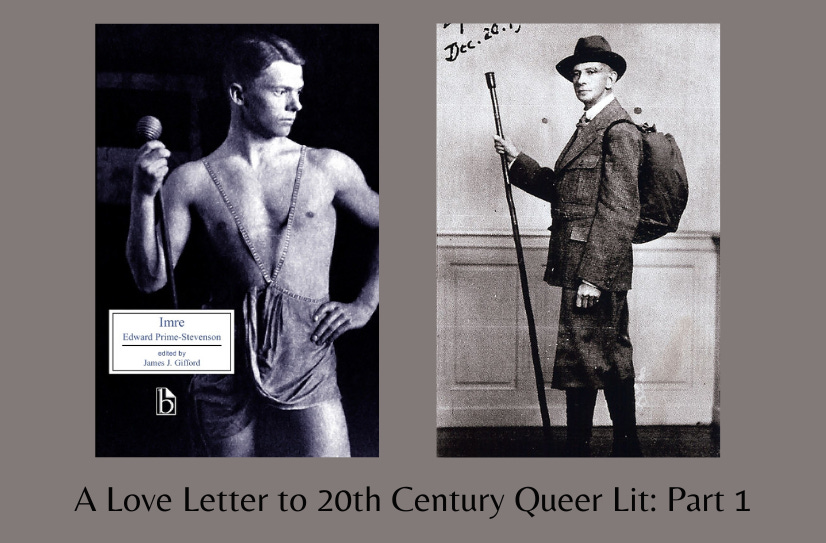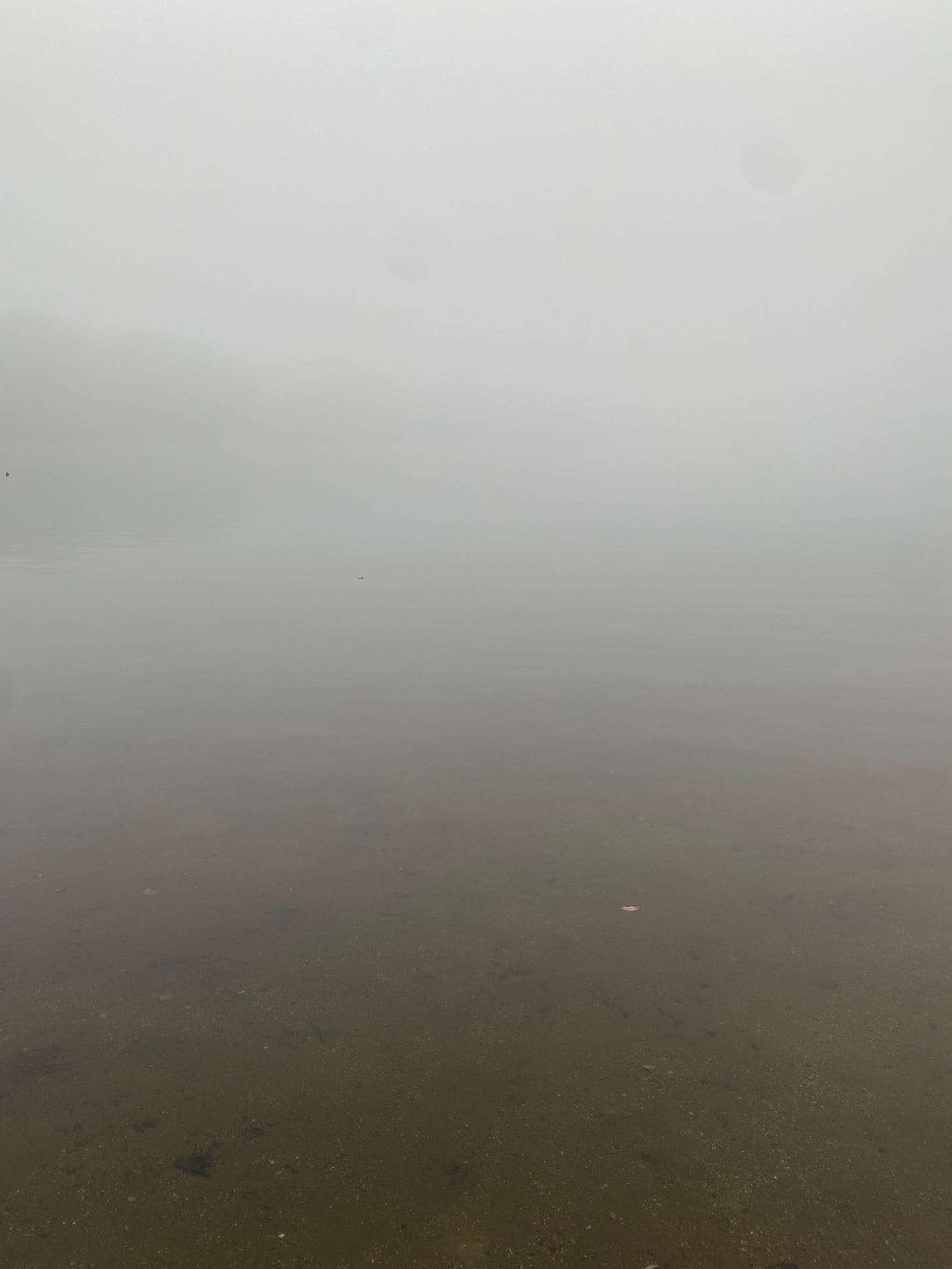Volume 3, No. 40: A Love Letter to 20th Century Queer Lit (Part 1)
On Imre: A Memorandum (1906)
Greetings, book and treat people! As of today, I’ve put my body into a body of water for 62 consecutive days. It has been a gift, the best gift I’ve received from the world (and myself) in some time. I wrote a little bit about it in last week’s September reading reflections.
As always, I had three books picked out to write about today. Then my review of Imre: A Memorandum hit 1200 words, and I realized I had just as much to say about Pictures of the Floating World by Amy Lowell (1919) and Quicksand by Nella Larsen (1928). So I’m doing something unprecedented. I’m tossing aside the structure I’ve been using to write this newsletter for the past two and half years and trying something new. Today’s issue will only include a review of Imre. Next week I’ll tackle Pictures of the Floating World, and the following week I’ll review Quicksand.
I don’t know what else you’ll find in these newsletters. I’m giving myself permission to go wild. I might include all the usual sections, or none of them. It’s an experiment in play. I want to see what excites me the most when I sit down each week to write. I want to see what excites you.
I came up with a structure not only because I like order, but because structure often creates space for creativity. Knowing exactly what the newsletter will look like each week gives me more freedom to focus on the actual content. At least, it did. It’s not working anymore. It’s starting to feel like I’m just ticking boxes to tick boxes. That’s not what I’m here for, and that’s not what you’re here for. So it’s time for an October experiment. Honestly, this is terrifying. But it’s the good kind of terrifying.
I’ll be sending out all issues to both paid and free subscribers for the rest of the month. I can’t wait to see what we all discover. I hope it’s wonderful and unexpected. I’m so grateful you’re here with me, reveling in books.
The Book
Imre: A Memorandum by Edward Prime-Stevenson (Fiction, 1906)
This is a book I never would have picked up, let alone known about, if I hadn’t gone digging into 20th century queer lit. It’s the sort of book I didn’t even realize existed before this year, mostly because of what I have been taught about queer lit—that happy queer stories are a new invention. How freeing it has been to discard this ghastly misconception. Imre is a short, elegantly plotted, deeply moving, often funny love story. While traveling in Budapest, a young British man, Oswald, meets Imre, a Hungarian soldier. They strike up a conversation, become friends, and eventually fall in love—though there is a lot of hand-wringing and obfuscating before they both admit it. Is there explicit sex on the page? No. Is there an HEA? You bet.
What’s most extraordinary to me about this book is how current it feels. This, I think, is due to the specificity of the characters and their histories. It reads a lot like a contemporary romance novel to me. Prime-Stevenson uses different language and hits different beats in the plot, but the emotional heart of the book is less about what Imre and Oswald face as gay men in late 1800s/early 1900s and more about how they manage intimacy as two people with different life experiences. Of course time and place matter; they always do. Of course late 18th century/early 20th century European assumptions and attitudes toward queerness affect how the characters see each other and themselves. But not all books set in times and places in which homosexuality is illegal and/or taboo center homophobia. This novel, like so many other 20th century queer books I’ve read, changes the conversation.
After weeks of long walks and heated glances and a shared feeling of ease, Oswald finally tells Imre how he feels. He shares a story about how he once loved another man, told him so, was cruelly rejected, and lost a friend he cared about. Despite the pain of this experience, he has vowed never to put himself through the agony of lying again:
Never again, if unquiet with such a passion, would I attempt to wear to the end the mask, to fight out the lie, the struggle! I must be taken as I am, pardoned for what I am; or neither pardoned nor taken.
He knows himself. He’s decided that the possibility of being seen is worth the risk of rejection and violence. This is what fuels everything he does: he will not be made small again. His declaration to Imre is loud, ebullient, obvious. (Prime-Stevenson has a flair for gay drama; there are so many exclamation points; it’s delicious.) He opens himself up, body and soul, prepared for whatever comes next: reciprocation, silence, bodily harm.
Imre, on the other hand, has rarely given himself permission to even consider the possibility of queerness in himself. He’s spent his life forcibly ignoring it. Oswald’s declaration shocks him, not because of its content, but because he’s never imagined such a speech possible. He doesn’t know what to do, so he tells Oswald never to speak of it again. This, in my opinion, is the most incredible scence in the book, this heartbreaking moment when Imre wants to speak and can’t. I know this feeling intimately. It can be a lot—too much—to hear someone say out loud a thing you have only ever thought to yourself in the deepest dark of night. When Imre realizes that he might not be alone, that Oswald might, in fact, see him—it’s too much. If you’re not used to being seen, if you’re used to only being looked at—well, someone seeing you, finally, out loud? That’s scary as fuck.
There is a certain kind of overwhelm that comes with having your queerness seen by someone else’s queerness for the first time. I’m convinced this happens universally, in 1906 or 2006 or 2026. It’s hard to untangle the feelings that come with being seen from the feelings that come with being in love. Stevenson-Prime writes so beautifully about this. Imre and Oswald have to navigate falling in love in a world where they are not allowed to love each other publicly, but the real tension stems from how vulnerable they are willing to be with each other, how patient. The real story is about finding the courage to speak.
In that heartbreaking moment, Imre does the only thing he knows how to do—he gets himself out of the conversation. Oswald makes his own assumptions about why. Miscommunication done right! Everyone is miserable! It’s not until later, having been called away for work, and thus getting a little space from Oswald, that Imre can explain what happened, which he does in an incredibly tender and romantic letter:
For you see, so much that I have shut into myself I know now that I can trust to your heart. But give me a little time. To have a friend to trust myself to wholly—that is new to me.
Reader, I teared up. When Imre returns from his trip, he requests a do-over, finally telling Oswald what he could not say before. The book ends with the two of them staring into each other’s eyes and sappily declaring their endless love and devotion to one another. This is not a spoiler. It is, essentially, a romance novel.
It’s also so delicious and gossipy. Oswald is so dramatic and lovesick. He goes on and on about how beautiful Imre is, how perfect, what a gorgeous man, etc., for literal paragraphs. Then seemingly out of nowhere he makes these profoundly beautiful observations about love: “We are drawn together because we are drawn. We are content to abide together just because we are content.”
I know that romance isn’t a new genre, that Jane Austen’s novels are often considered romances, that people were writing romance in the 19th century and before. But publishing, and the book world at large, is still selling this lie that queer happily-ever-afters are new. Imre isn’t the most incredible book I’ve ever read, and this is precisely why I love it so much, why it had such an impact on me. I did not know 20th century gay fluff existed.
The novel opens with a letter from Oswald to his publisher, explaining why he has written it all down:
As speaking out to any other human heart that is throbbing on in rebellion against the ignorances, the narrow psychologic conventions, the false social ethos of our epoch (too many men’s hearts must do so!), as offered in a hope that some perplexed and solitary soul may grow a little calmer, may feel itself a little less alone in our world of mysteries—so do I give this record to you, to use it as you will. Take it as from Imre and from me.
I had to put the book down for a minute after reading this. I was thinking about Oswald, the character, having fallen in love and wanting the world to know about it, and about Prime-Stevenson, the author, writing as Oswald, sending the manuscript off to a publisher, desperately hoping it would find its way to the people who needed it. Only 500 copies were printed, and he wrote using a pen name, but still: Prime-Stevenson wrote so that he might reach someone, and that’s what we’re still doing. That’s still how we talk about queer books. We go on, and things get better and then worse and then better, they change and cycle, and through it all, being seen matters. I’ve written at length about “representation” as a concept and how much I hate it, and I do, and still: I am, in many ways, that person Prime-Stevenson was writing to. I read his words, and grew a little calmer, felt a little less alone.
The edition I read, which I highly recommend, has an excellent introduction by James Gifford, and includes a lot of fascinating historical matter. There’s a letter Prime-Stevenson wrote to an editor friend explaining why he wrote Imre (it’s essentially a longer version of Oswald’s letter), as well as letters to a friend about the defining love affair of his life, which ended in heartbreak when his lover decided to get married. Also included is a tragic short story Prime-Stevenson published about the affair, which has the kind of ending most of us have come to expect from 20th century queer lit—everyone ends up dead or straight. There are several excerpts from some of the published sexological studies of the time (e.g. Sexual Inversion). These are mostly short and highly clinical case studies of gay men, in which homosexuality is treated as a medical condition to be fixed. I loved all of this context; it made my nerdy heart sing.
But is it incredible that Prime-Stevenson wrote and published this gay fluff in 1906? Was it “ahead of its time”? What a nonsense idea. I don’t buy into it. Imre is of its time, and of every time, as all books are. It’s about upper-class white European men with quite a bit of internalized misogyny they don’t work through. It’s not perfect. I loved it. This is one of the many wisdoms I have found in my grappling with 20th century queer lit: our work, as readers, as humans, is to love the imperfect.
The Beyond
Fall Nibbles
I made my first batch of applesauce of the season! Here’s my applesauce recipe: I halve and then roughly chop a bunch of apples, maybe a 1/2 peck bag. Into the pot they go: seeds, stems, skin, and all. I add just enough cider to moisten the bottom of the pot, and let it simmer until everything is soft and mushy, about 2 hours, sometimes more. Then I process it with a food mill, which separates out all the seeds and gunk. The result: thick, gorgeous, flavorful applesauce with minimal work.
I used some of the applesauce to make this apple spice cake with cider glaze. It was incredible.
I also made my first potato leek soup of the season! For this I sauté a ton of leeks in a ton of butter. I add a whole head of garlic, pressed, salt, and a few generous grinds of pepper. Then I add a bunch of potatoes, chopped, along with stock, or, if I don’t have any, water. I let it all simmer until the potatoes are falling apart, blend it, add some milk, a dash of lemon juice, and more salt and pepper to taste. It’s good with cheddar on top.
Recent Audiobooks
Here are some audiobooks I’ve enjoyed over the last few weeks:
If you’re hankering for cozy space vibes, don’t care about plot, and love aliens: The Galaxy, and the Ground Within by Becky Chambers, read byRachel Dulude.
If you’re angry and looking for another reason to burn down academia: Sipping Dom Pérignon Through a Straw by Eddie Ndopu, read by the author.
If you like your romance with a hefty helping of plot and you want to learn more about Black queer Harlem history, Lush Lives by J. Vanessa Lyon, read by Elle Cleviden.
If you’re in the mood for gorgeous stories about Indigenous kinship that are equal parts tenderness and humor: Islands of Decolonial Love by Leanne Betasamosake Simpson, read by Tantoo Cardinal.
Further Reading
Alexis by Marguerite Yourcenar, tr. Walter Kaiser (1929): I wrote about this book earlier in the year; it pairs beautifully with Imre.
The Tree and the Vine by Dola de Jong, tr. Kristen Gehrman (1954): This is a tragic 20th century queer book, but the tragedy is specific to the characters and their emotional messes. It’s not tropey. Imre is a bit tropey. I think it would be fascinating to read them together.
And Then He Sang a Lullaby by Ani Kayode (2023): This is not a romance. There is absolutely no HEA. It’s devastating. But it is a love story about two men whose relationship is deeply affected by their differing life experiences, and about how they each find the courage to speak.
The Bookshelf
Around the Internet
On Book Riot, I wrote about how much I love my library’s circulating zine collection, and I rounded up some great gay historical romantacies.
A Taste of the Commonplace
To celebrate 62 consecutive days of swimming, I searched for passages tagged with ‘water’ in my commonplace book. Here’s a line from K-Ming Chang’s beautiful and eerie story collection Gods of Want, which I read last year:
The water had no nostalgia, no desire to witness anything but its own rise, its erasure of everything named.
Queer Your Year
Thanks to everyone who participated in the September raffle, and congrats to Hannah, who won the mystery queer book bundle! The October prize includes a copy of one of my favorite novels of the year (Family Meal by Bryan Washington), and some fun swag from Libro.fm: a mug and a beanie, just in time for fall coziness!
As always, don’t forget about the super fun prize packs! Everyone who submits a game card gets one, and they ship internationally. And please come join the Queer Your Year discord if you haven’t already! If you’re stuck on a prompt (or just want to chat about queer books), it’s the place to be.
And Beauty
As always, a little bit of beauty to send you on your way: Fall leaves are magic. Pure, unadulterated, gasp-every-time-I-see-them, no-words-big-enough-for-the-perfection-of-it magic. Fight me.
Catch you next week, bookish friends!








How wonderful to see a post about Prime-Stevenson and Imre in the wild! It's such a fantastic book. I read it in grad school and it completely changed the way I thought about queer literature. I actually offer a personalized edition (aka with an introduction by me) to new subscribers. Your post here is fantastic. Thank you for spreading the word about the book!
Structure and plans and a path you've laid out for yourself works so well... until it doesn't. I'm proud of you for experimenting (because I know it's hard, and there is self-doubt, among other things) and I can't wait to see what unfolds 🩷